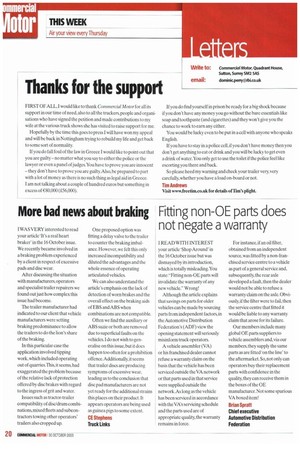I WAS VERY interested to read your article it's a
Page 20

If you've noticed an error in this article please click here to report it so we can fix it.
real heart braker' in the 16 October issue. We recently became involved in a braking problem experienced by a client in respect of excessive pads and disc wear.
After discussing the situation with manufacturers, operators and specialist trailer repairers we found out just how complex this issue had become.
The trailer manufacturer had indicated to our client that vehicle manufacturers were setting braking predominance to allow the trailers to do the lion's share of the braking.
In this particular case the application involved tipping work, which included operating out of quarries.This, it seems.had exaggerated the problem because of the relative lack of protection offered by disc brakes with regard to the ingress of grit and water.
Issues such as tractor-trailer compatibility of disc/drum combinations, mixed fleets and subcontractors towing other operators' trailers also cropped up. One proposed option was fitting a delay valve to the trailer to counter the braking imbalance. However, we felt this only increased incompatibility and diluted the advantages and the whole essence of operating articulated vehicles.
We can also understand the article's emphasis on the lack of detection of worn brakes and the overall effect on the braking aids of EBS and ABS when combinations are not compatible.
Often we find the auxiliary or ABS suzie or both are removed due to superficial faults on the vehicles. I do not wish to generalise on this issue, but it does happen too often for a prohibition offence. Additionally, it seems that trailer discs are producing symptoms of excessive wear, leading us to the conclusion that disc pad manufacturers are not yet ready for the additional strains this places on their product. It appears operators are being used as guinea pigs to some extent.
CE Stephens Truck Links




























































































































































































